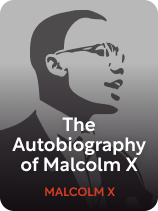

This article is an excerpt from the Shortform book guide to "The Autobiography of Malcolm X" by Malcolm X and Alex Haley. Shortform has the world's best summaries and analyses of books you should be reading.
Like this article? Sign up for a free trial here.
What was Malcolm X’s childhood like? What was his first experience with racial equality?
Malcolm X was a controversial figure. His views were often considered extreme, and they changed radically throughout his life. His autobiography provides a glimpse into his life as well as the history of the troubled and complicated world he inhabited.
Continue reading for a few The Autobiography of Malcolm X quotes that will introduce you to the book’s ideas.
The Autobiography of Malcolm X Quotes
Published in 1965, The Autobiography of Malcolm X explains how Malcolm X rose from a life of poverty and crime to become a significant leader of the civil rights movement. In telling his life story, Malcolm X explains why he believed what he believed—and why he fought stalwartly for racial justice, even though he knew it would lead to his death.
This book was written by Malcolm X and Alex Haley, a journalist and author of the novel Roots, which later became a record-breaking television series. Haley recorded interviews with Malcolm X, minimally edited the transcripts, and compiled them into an autobiography—which means the autobiography is given in Malcolm X’s own words.
We’ve added some context to the following The Autobiography of Malcolm X quotes to help you understand Malcolm X’s ideas.
“Once he is motivated no one can change more completely than the man who has been at the bottom. I call myself the best example of that.”
When Malcolm X was six, his father died, and the family suffered tremendously because Little had been the sole breadwinner and the Great Depression was on. The family received some welfare, and Malcolm X’s mother, Louise Little, tried to work. But, the racism she encountered made it hard for her to keep a job. Malcolm X recalls that he began stealing food at this point.
“If someone puts their hands on you make sure they never put their hands on anybody else again.”
One part of Malcolm X’s approach to civil rights was self-defense against racism, by way of violence if necessary. Male members of the Nation of Islam were enrolled in a program called the Fruit of Islam—the Nation of Islam’s security division—where they’d be trained in self-defense tactics like judo. Malcolm X believed that this was necessary because white people had continually perpetrated violence against Black people; furthermore, he explains that not only did he believe that Black people had a right to protect themselves, but also that it would be morally wrong for them not to defend themselves against white violence.
“I remember one night at Muzdalifa with nothing but the sky overhead I lay awake amid sleeping Muslim brothers and I learned that pilgrims from every land—every color, and class, and rank; high officials and the beggar alike—all snored in the same language.”
Malcolm X explains that he’d heard criticism that the Nation of Islam was not truly Islamic—and since he was still a firm believer in Islam, he decided he needed to learn more about the religion. Since all Muslims are required to make a pilgrimage to Mecca at least once in their lifetime if they’re able, Malcolm X decided to do so—he wanted to see for himself what Muslims were like in the Middle East.
During Malcolm X’s travels, he was continually surprised by how united Muslims in the Middle East were—it seemed that racism didn’t exist there, as people with all complexions and ethnic backgrounds treated each other with respect and dignity. All the pilgrims were spiritually equal, and that was all that mattered as they traveled to Mecca. This was the first time Malcolm X had experienced racial equality, and it bewildered and excited him to finally be treated as a human being by the general public.

———End of Preview———
Like what you just read? Read the rest of the world's best book summary and analysis of Malcolm X and Alex Haley's "The Autobiography of Malcolm X" at Shortform.
Here's what you'll find in our full The Autobiography of Malcolm X summary:
- Malcolm X explains why he believed what he believed
- The historical and sociological context surrounding Malcolm X’s life
- Why Malcolm X was such a controversial figure






